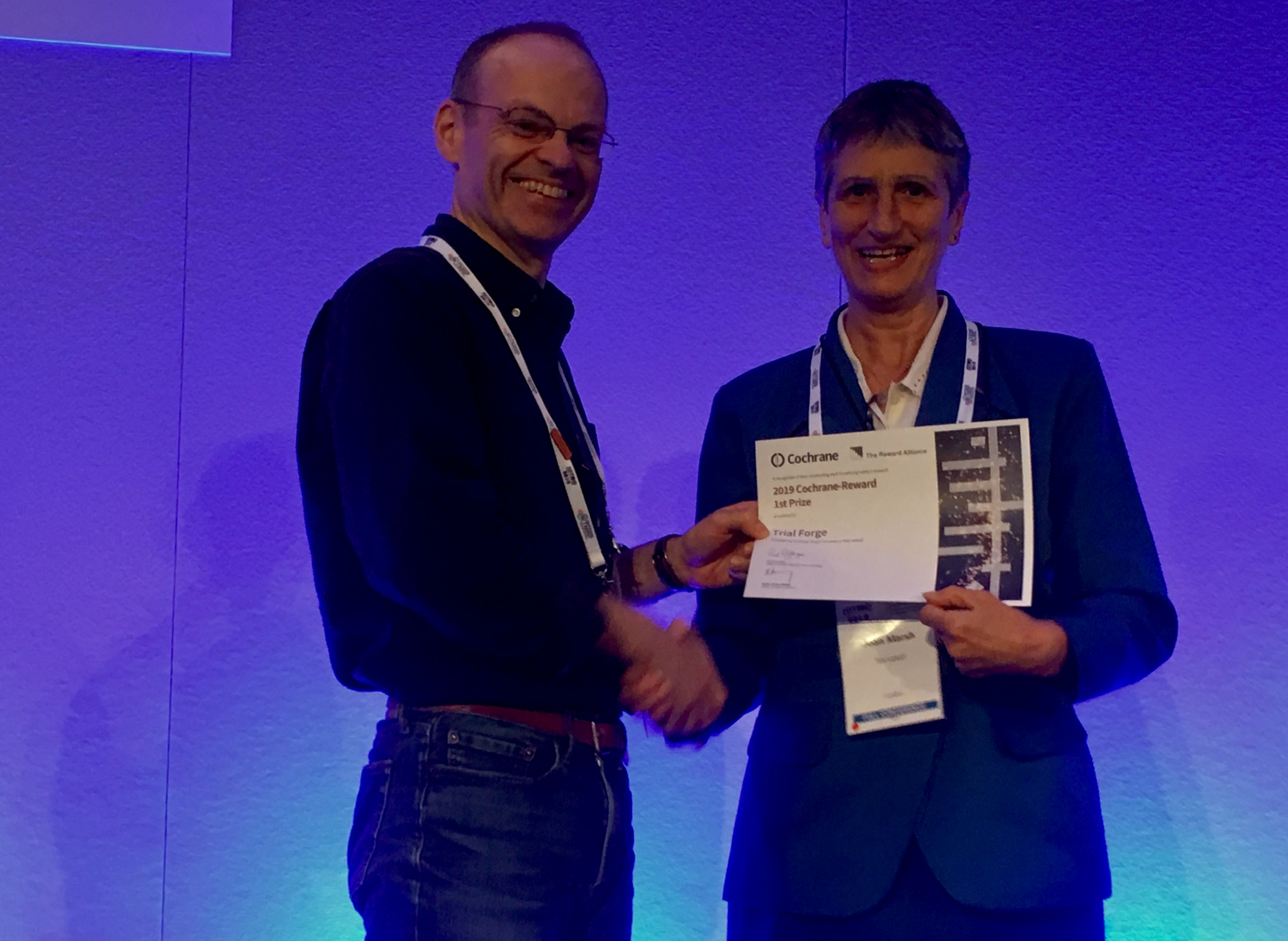
We are pleased to announce the winners – one first place and two runners-up – of this year’s Cochrane-REWARD Prize. The Cochrane-REWARD Prize recognizes successful local or pilot initiatives that have potential to reduce research waste globally if scaled up. Cochrane has funded the prize annually since it began in 2017.
The prize ceremony took place on Wednesday 9 October at the International Clinical Trials Methodology Conference in Brighton, UK. Dr Joan Marsh, Deputy Editor of The Lancet Psychiatry and member of the prize committee, was there to hand out the prizes. During the conference, each recipient also had the opportunity to present about their initiative in a session dedicated to research waste.
First prize: Trial Forge
This year’s first prize went to Trial Forge, an initiative established in 2015 to address evidence gaps in how randomized trials are designed – and, in doing so, improve trial efficiency.
So far, Trial Forge has focused on:
- Raising awareness of the lack of evidence for optimal trial processes,
- Prioritization of unanswered research questions in recruitment and retention,
- Establishing Studies Within A Trial (SWATs) as a central method for generating evidence about more effective trial processes.
Trial Forge is a collaboration coordinated from the Health Services Research Unit at the University of Aberdeen – with Trial Forge Centres in the UK and Switzerland, and plans to expand this network. Outreach to the research community, both face-to-face and via webinars, is at the core of the project.
Key successes to date include working with the National Institute of Health Research (NIHR) to introduce a funding stream for SWATs in their health technology assessment programme and being a leading partner in PROMETHEUS, which funds around 30 recruitment and retention SWATS.
With regards prioritization, Trial Forge was a major partner in two James Lind Alliance Priority Setting Partnerships, on recruitment and retention of participants, resulting in lists of key unanswered research questions for each topic.
Work is also underway on trial site selection – a list of ‘red flags’ for poor trial recruitment has been developed and is being tested. The goal is to help trial teams predict the likelihood of recruitment success and risk manage potential problems.
The prize committee was very impressed with Trial Forge, deeming it to be an initiative with great potential to improve efficiency in trials when scaled up. Professor Shaun Treweek, who is leading Trial Forge at the University of Aberdeen, accepted the prize on behalf of the initiative.
Joint second prize: MASK
The Meta-Analysis of SKewed data (MASK) collaboration received joint second prize. Professor Christopher Weir accepted the prize on behalf of the project team.
MASK aimed to develop effective methods for handling continuous outcome measures in evidence synthesis. While the project case study focused on trials of rehabilitation interventions for stroke, the methods identified by MASK are generic and could be applied to any situation where a mean or standard deviation summary statistic of a continuous outcome is missing.
Continuous outcome measures include those related to quality of life, which are of high importance to patients and carers, but can be difficult to include in meta-analysis due to skewed distributions. This may mean that information is excluded from the evidence synthesis, leaving potential for bias or reduced accuracy.
First, authors of Cochrane Reviews on stroke rehabilitation interventions were surveyed to assess the scale of the issue. The team then did a systematic review of methodology literature to identify potential new methods. The most promising methods were applied to individual patient data from a stroke rehabilitation systematic review to test them for accuracy and ease of use, and results were disseminated to the systematic review community through a variety of channels. Several Cochrane Review author teams have since applied the recommendations in their reviews.

Joint second prize: Preclinicaltrials.eu
Preclinicaltrials.eu received the other joint second prize, and Dr Mira van der Naald of UMC Utrecht accepted the prize on behalf of the project.
Preclinicaltrials.eu is an online database where researchers can register their animal studies, upload protocols and link to publications and data sources. While clinical trials now have multiple registration platforms the preclinical field has had no means to register studies; Preclinicaltrials.eu fills the gap.
To avoid unnecessary duplication of animal studies and optimize design of new trials, the platform can be searched at the start of a new study for an overview of registered trials and to find contact details for researchers working on comparable projects. The registration form also prompts users to consider whether they are minimizing risk of bias.
Currently, most efforts are going towards raising awareness of the database and encouraging more researchers to register and upload their protocols. The team is engaging a wide group of stakeholders on preregistration, including policymakers in the Netherlands, funders, journals, animal welfare bodies, scientific societies and academic institutions.
Cochrane-REWARD prize in 2020
In reviewing this year’s submissions, the Cochrane-REWARD prize committee noted that, now in its third year, nominations continued to be diverse (both geographically and in terms of approach) and innovative. The three prize recipients are just a few examples of the interesting and promising initiatives currently underway to reduce waste in research.
We look forward to continuing the prize next year; and encourage the initiatives not previously at an advanced enough stage to consider submitting a nomination in 2020. A formal call for nominations will be issued early next year.

